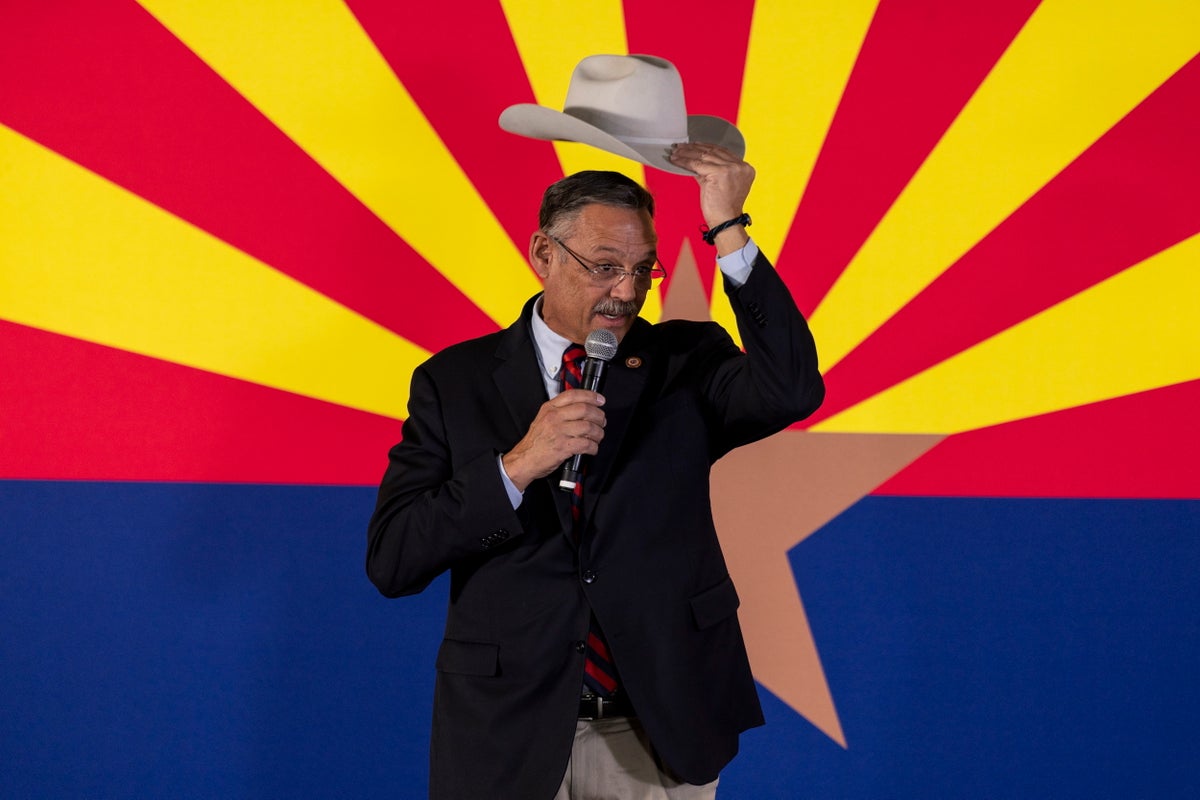
Donald Trump’s endless grievances and a bogus narrative that the 2020 presidential election was stolen from him have fuelled dozens of Republican campaigns across the US, from local-level races to elections for governor and US Senate seats.
At least 145 Republicans who rejected the 2020 outcome have won their races in midterm elections for the House of Representatives, eclipsing the 139 House Republicans who objected to the counting of electoral votes in the aftermath of the attack on the US Capitol on 6 January, 2021.
But among the 94 races for statewide offices this year, only 14 candidates who have amplified election lies have won their races, according to analysis from pro-democracy group States United Action.
The movement has failed to gain any significant ground, dealing a major blow to Mr Trump’s attempt to purge state officials who rejected his baseless claims of widespread fraud as the former president and GOP lawmakers lay the groundwork for an antidemocratic agenda.
So-called election deniers have won fewer than one in six races for statewide positions that oversee election administration, including governor, secretary of state and attorney general – roles that will be critical in 2024 elections.
As of 11 November, only five new election-denying candidates in Alabama, Idaho, Indiana, Kansas and Wyoming have won their respective races, along with nine incumbents in Alabama, Florida, Iowa, Kansas, South Carolina, Tennessee and Texas. All 14 races where so-called election deniers won their races are in states that voted to elect Mr Trump.
No non-incumbent election deniers have won any of the 36 races for governor.
Among the 31 races for state attorney general, only two candidates who were not incumbents have won their elections.
Only three non-incumbent candidates for secretary of state, out of 27 races, have won their elections.
“When you break the results down by incumbents vs new candidates, it’s apparent that this year’s midterm was a referendum on the election denial movement,” Thania Sanchez, senior vice president of research and policy development at States United Action told The Independent in a statement.
There are not enough still-undecided races left for that lack of ground to shift.
“Americans overwhelmingly rejected candidates running for statewide office who spread lies and conspiracy theories about our election system,” she added.
But the movement isn’t likely to disappear heading into 2024, according to States United Action CEO Joanna Lydgate.
“This is a continuing threat,” she said in a statement to The Independent.
Results from Arizona – one of two states where election-denying GOP candidates were in races for all three top statewide offices – have not yet been finalised.
Arizona was one of the main stages of Mr Trump’s effort to overturn the 2020 election. Two years on from that night, the state has remained at the centre of bogus election conspiracy theories and harassment aimed at voters and polls workers.

Katie Hobbs, the Democratic candidate for Arizona governor, has maintained a slim lead over far-right candidate Kari Lake.
Adrian Fontes has defeated Mark Finchem, a member of the far-right militia group the Oath Keepers who rallied in Washington DC before the Capitol attack.
In Nevada, Cisco Aguilar defeated Republican candidate Jim Marchant for secretary of state. Mr Marchant pledged to eliminate the use of electronic voting machines, voting by mail and all early voting, using only a “traceable paper-ballot-only” system that would likely throw elections into chaos.
He also leads the America First Secretary of State Coalition, which promoted conspiracy theorists in races for key election oversight positions.
All of the figures with a QAnon-adjacent activist coalition of secretary of state candidates seeking to subvert American elections – including Mr Marchant, Ms Finchem and Ms Karamo – have been defeated.
Democratic candidates in other battleground states that were challenged by Mr Trump and his allies in 2020 elections have also won critical state-level races.
Michigan Governor Gretchen Whitmer won re-election, defeating GOP candidate Tudor Dixon. Secretary of State Jocelyn Benson also defeated election denier Kristina Karamo, who had filed a last-ditch lawsuit ahead of Election Day to try and disqualify thousands of voters in majority-Black, Democratic-leaning Detroit.

Democrats also took control of the state legislature, including majority control of the state Senate for the first time in nearly 40 years.
In Minnesota, Democratic Governor Tim Walz won re-election, and Democrats flipped the state Senate and maintained control of the state House – another state with a so-called Democratic “trifecta”.
Both states now have critical firewalls against GOP attempts to disrupt elections in 2024.
In Wisconsin, Democrats denied Republicans from taking a supermajority in the state legislature, offering a crucial buffer that would prevent GOP lawmakers from overriding a veto from Governor Tony Evers.
And in Pennsylvania, Trump-backed far-right conspiracy theorist Doug Mastriano was defeated by Josh Shapiro, and Democrats are just one seat away from flipping control of the state House.

Daniel Squadron, an organiser with The States Project, which supported Democratic candidates in state legislature battlegrounds with a $60m campaign, told reporters on 10 November that the group’s goal was to “gain as much ground this year to set ourselves up for the next”.
He noted that the officeholders who are elected in 2022 will be there during 2024 presidential elections, potentially facing off against another insurgent legal attack from Mr Trump and his political allies in those states.
Two years after the former president prematurely and falsely declared victory, many of his loyalists conceded in races they lost – even when they pledged to refuse to accept the outcome.
The morning after news outlets projected her loss in the race for Michigan’s governor, Ms Dixon said in a campaign statement that she had called Governor Whitmer “to concede and wish her well.”
“We came up short, but we will never stop fighting for our families,” she said.
GOP nominee for Michigan attorney general Matthew DePerno also conceded to the incumbent on Wednesday morning.
“Although I may be conceding to Dana Nessel today, I refuse to concede that Michigan is a blue state,” he wrote on Twitter.
Tim Michels, the GOP nominee for governor in Wisconsin, had previously suggested that he would decertify President Biden’s victory in the state, a claim that other Republican election deniers have made as they campaigned for state-level office.
He conceded to Governor Tony Evers on Election Day.







